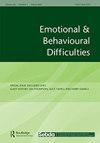有和没有注意缺陷/多动障碍或特殊学习障碍儿童的友谊质量、情绪理解和情绪调节
IF 1.5
Q3 PSYCHOLOGY, EDUCATIONAL
引用次数: 5
摘要
理解和调节情绪影响着儿童的友谊。患有注意缺陷/多动障碍(ADHD)和特殊学习障碍(SLD)的儿童在理解情绪和控制自己方面存在困难。Τhe目前的研究考察了儿童的友谊及其质量如何受到情感理解和调节技能的影响。参与者是64名ADHD儿童、64名SLD儿童和64名典型发育(TD)儿童(Mage = 9.77岁,SD = 1.22),他们回答了关于他们的友谊、情绪理解和调节的问卷。结果表明,ADHD儿童的朋友较少,友谊品质较低,对情绪的理解和冲动控制较差,使用认知重评价来调节情绪的能力较差,其次是SLD儿童,最后是TD儿童。据报道,患有特殊障碍的儿童使用更多的表达性抑制来调节情绪。对于所有的孩子来说,情感理解和调节预示着更高的友谊质量。结果支持理解和调节情绪对儿童最好的友谊质量的重要性。本文章由计算机程序翻译,如有差异,请以英文原文为准。
Friendship quality, emotion understanding, and emotion regulation of children with and without attention deficit/hyperactivity disorder or specific learning disorder
ABSTRACT Understanding and regulating emotions influence children’s friendships. Children with Attention Deficit/Hyperactivity Disorder (ADHD) and Specific Learning Disorder (SLD) have difficulties in understanding emotions and in controlling themselves. Τhe present study examines how children’s friendships and their quality may be affected by emotion understanding and regulation skills. Participants were 64 children with ADHD, 64 children with SLD, and 64 typically developing (TD) children (Mage = 9.77 years, SD = 1.22) who answered questionnaires about their friendships, and their emotion understanding and regulation. Results showed that ADHD children had less friends, lower friendship qualities, worse understanding of emotions and control of their impulsivity, and used less cognitive reappraisals to regulate emotions, followed by SLD children and finally by TD children. Children with SLD reported using more expressive suppressions for regulating emotions. For all children, emotion understanding and regulation predicted higher friendship quality. The results support the significance of understanding and regulating emotions upon the quality of children’s best friendships.
求助全文
通过发布文献求助,成功后即可免费获取论文全文。
去求助
来源期刊

EMOTIONAL AND BEHAVIOURAL DIFFICULTIES
PSYCHOLOGY, EDUCATIONAL-
CiteScore
1.80
自引率
10.00%
发文量
10
期刊介绍:
The central intention of Emotional & Behavioural Difficulties (EBDs) is to contribute to readers" understanding of social, emotional and behavioural difficulties, and also their knowledge of appropriate ways of preventing and responding to EBDs, in terms of intervention and policy. The journal aims to cater for a wide audience, in response to the diverse nature of the professionals who work with and for children with EBDs.
 求助内容:
求助内容: 应助结果提醒方式:
应助结果提醒方式:


